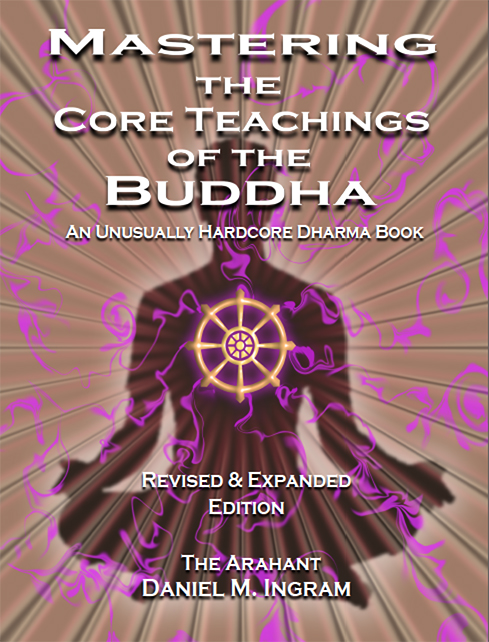Dependent Origination Revisited
← Describing Your Practice | Final Wishes →
It can be fun to revisit topics and put them together in ways that weren’t as easy before a lot of theory was established and defined, and dependent origination is one of those topics. To refresh, the twelve links of dependent origination are: death, aging, sickness, pain, lamentation, grief, and despair all depend on birth, which depends on becoming, which depends on clinging, which depends on craving, which depends on vedana, which depends on sense contact, which depends on the six sense doors, which depend on name and form, which depend on consciousness, which depends on volitional formations, which depend on ignorance. If you have gotten to this point in the book without reading the section earlier in Part Five that explains all that, it is probably best to go back and read that now unless you are already well-versed in dependent origination.
The further along we get into that list, the harder it is to understand. Similarly, you can line up many dharma teachings with various levels of dependent origination, and you will find that those that address the beginning of the list are much more accessible than those that address links towards the end of the list. You will also be able to get some sense of your own practice and its depth by the degree to which you are able to perceive for yourself the truths being pointed to at the level of each of the twelve links.
For example, many beginning teachings start with topics such as ordinary suffering, loss, death, pain, conflict, and the like. Everyone can understand what is being talked about, as these are straightforward aspects of life. Birth is also straightforward. However, terms like “becoming” make a lot more sense if you have had experiences of past lives in your practice, and talking about these to people who haven’t had those experiences often ends in frustration.
Clinging and craving seem obvious, but they have layers that are subtler than the first three terms. We can all relate to the concepts of clinging and craving on some level. Someone breaks our heart, but we still love them, so we suffer grief. This is a clear example that nearly everyone can relate to. However, there are many levels to be understood regarding clinging and craving, from the gross—such as in that example—to the very subtle that get to the heart of the dharma.
Anyone who has gotten at least stream entry and has had a clear suffering door Fruition will have a more direct sense of what is really meant by clinging in the context of the dharma, as that clinging will have been ripped from them. By the time we get to the higher end of the middle paths, it gets easier to see exactly what is meant by clinging and craving at a very fine level during our waking activities. If we manage to flash onto the experience of true centerlessness, luminosity, and agencylessness, even for a moment, we will have had a taste of a world free of the deeper dharmic meanings of clinging and craving. If we manage to stabilize this, we will truly know the depths of what those concepts are referring to and what it is like to have them vanish.
Dependent origination gives a brief break in the subtlety with vedana, sense contact, and the six sense doors, or so it seems, as these seem straightforward. However, really comprehending exactly how vedana causes mental reactions takes a lot of clear perception of very fine phenomena. Really noticing the subtleties of the six sense doors and all the little phenomena that they show us takes a very well-trained and finely analytical mind made powerful by meditation. Those who get to the level of perceiving the microphenomenology detailed in the Abhidhamma have gotten to the level of deep dharma comprehension of these aspects of dependent origination. Those without this level of personal vipassana practice will have a hard time understanding the profundity of a text like that.
At one point, I had gotten way too far into complex models, more exotic practices, and intellectualization of the path. My first wife gave me a fantastic present, a very simple, small wooden box with one small piece of paper inside it. On it were written the words “the six sense doors”. That was all that was in the box. That was a truly great gift and a reminder to keep it simple.
Speaking of simple yet subtle, by the time we get to name and form, we are deep into the subtle and profound end of the dharma. Here, the sense doors are integrating, and we come to core aspects of bare experience. By the time we get to consciousness and volitional formations, the sense doors have fully integrated, name and form have integrated, and we are at the level of understanding formations as formations. We will have to have at least gotten solidly into Equanimity and appreciated what that mode of attention has to show us to get some real sense of what this level of dependent origination is talking about. However, that pales in comparison to the understanding of that those who have attained third path regarding this territory, by which point a skilled practitioner will be living a life that experiences a day-to-day level of deep insight into teachings such as “there is only one integrated sense door”, or “the dharma, like the great ocean, has one taste”.
Finally, while those of lower levels of realization will get a sense of what is meant by “ignorance” during moments of High Equanimity, during Conformity, and during subsequent manifestations of the three doors, to get this fully requires the degree of clarity of the arahant. While intellectually we may understand, “Ah, the whole field of experience is just directly knowing itself and happening perfectly causally as an integrated, immediate, transient whole,” this bit of theory is nothing compared to the final direct knowledge of how this would preclude the sort of differentiation and complexities that the other links in the chain of dependent origination represent. Thus, if you have it in you to do so, try for the level that comprehends sensate reality so clearly that the illusion of ignorance falls away and these brilliant truths are directly revealed to you all the way to the base of the great chain.

